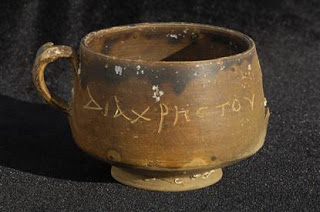
 |
Freethought & Rationalism ArchiveThe archives are read only. |
|
|
#1 |
|
Contributor
Join Date: May 2010
Location: Babble Belt
Posts: 20,748
|
Earliest reference describes Christ as 'magician'
10/1/2008 A team of scientists led by renowned French marine archaeologist Franck Goddio recently announced that they have found a bowl, dating to between the late 2nd century B.C. and the early 1st century A.D., that is engraved with what they believe could be the world's first known reference to Christ. If the word "Christ" refers to the Biblical Jesus Christ, as is speculated, then the discovery may provide evidence that Christianity and paganism at times intertwined in the ancient world. The full engraving on the bowl reads, "DIA CHRSTOU O GOISTAIS," which has been interpreted by the excavation team to mean either, "by Christ the magician" or, "the magician by Christ." "It could very well be a reference to Jesus Christ, in that he was once the primary exponent of white magic," Goddio, co-founder of the Oxford Center of Maritime Archaeology, said. Full Article |
|
|
|
|
#2 | |
|
Contributor
Join Date: Jun 2000
Location: Los Angeles area
Posts: 40,549
|
There is more here.
If you look at the inscription, it is not Christ, but Chrest (XPHST - with part of the eta ('H') missing.) There is no mention of Jesus. From this link: Quote:
|
|
|
|
|
|
#3 | |||
|
Contributor
Join Date: May 2010
Location: Babble Belt
Posts: 20,748
|
Quote:
Later in the article you linked: Quote:
|
|||
|
|
|
|
#4 | |||
|
Contributor
Join Date: Jun 2000
Location: Los Angeles area
Posts: 40,549
|
This was hot news in 2008, but I can't find where anyone has resolved the issues.
April DeConick: Magical Cup has nothing to do with Christ Quote:
Quote:
Unlikely Quote:
|
|||
|
|
|
|
#5 |
|
Contributor
Join Date: May 2010
Location: Babble Belt
Posts: 20,748
|
Meh. I was sort of hoping there might be some new information, but it looks like all we have is lots of speculation.
I personally love the idea of a magical Jesus water-to-wine cup. 
|
|
|
|
|
#6 |
|
Veteran Member
Join Date: Feb 2006
Location: Florida east coast, near Daytona
Posts: 4,969
|
[STAFFWARN]Thread moved from Abrahamic to Biblical Criticism and History, where it appears to fit better.[/STAFFWARN]
|
|
|
|
|
#7 | |
|
Regular Member
Join Date: Aug 2010
Location: highlands
Posts: 145
|
Quote:
Also: http://www.mountainman.com.au/essene...20christos.htm http://www.babylon.com/definition/CHRESTOS/English http://www.iahushua.com/ST-RP/christ.htm |
|
|
|
|
|
#8 | ||
|
Senior Member
Join Date: Jun 2008
Location: Italy
Posts: 708
|
Quote:
Greetings Littlejohn . |
||
|
|
|
|
#9 |
|
Contributor
Join Date: Mar 2006
Location: Falls Creek, Oz.
Posts: 11,192
|

|
|
|
|
|
#10 | ||
|
Veteran Member
Join Date: Jan 2007
Location: Mondcivitan Republic
Posts: 2,550
|
At this site the whole inscription can be seen.
It looks to me like the Greek words DIACRHSTOV OGOISTIAS or maybe the reverse OGOISTIAS DIACRHSTOV DIA ("dia" = through or by-means-of with words in Gentitive/Ablative case, because-of with words in accusative case) CRHSTON ("ChrEston" = adjective χρηστός, accusative masculine singular -or- vocative neuter singular -or- accusative neuter singular -or- nominative neuter singular = virtuous, good, useful; docile, pleasant, kind. The online articles misspell this, leaving out the H/eta, and they also treat the letter that looks like an "N" as a Roman style "U", making this CRHSTOU = "ChrEstou" which is either the substantive χρήστης, genitive masculine singular = lender, or adjective χρηστός, genitive masculine/neuter singular = virtuous, good, useful; docile, pleasant, kind as above) or alternatively DIACRHSTON (possibly "thorougly good/useful") O (I don't actually see it in the photo, but the masculine singular "ho" = "the" in the nominative case) GOISTIAS ("goistais" = no regular word, but may be based on GOHS = "goEs" howling-street-magician, but with no forms approximating this spelling). alternatively: OGOISTAIS (not a known word, but could be the technical term for a religious association dedicated to the god Osogo or Ogoa, whom Strabo and Pausanias name as a divinity worshipped in Milas, in Caria) or alternatively OGOIS (not a known word, but see above regarding the god OGOA) TAIS ("tais" = article ταῖς, dative feminine plural of the definite article "the") which of course makes no sense. I'd propose it is a drinking cup of the "Thoroughly useful association of Ogoa worshippers". Wine, anyone? How about a cheap giveaway gift cup "Compliments of your creditor, the association of Ogoas worshippers." My mortgage lender likes to send me calendars to ensure I don't forget I owe them $170,000. DCH Quote:
|
||
|
|
| Thread Tools | Search this Thread |
|